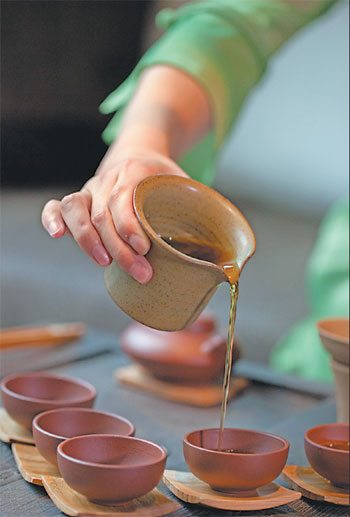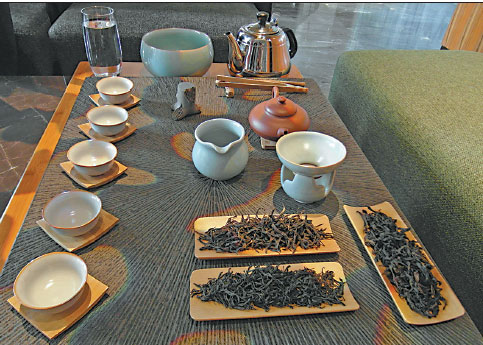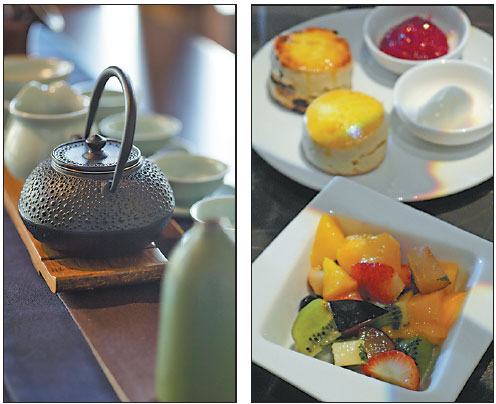Fine leaves flutter in a place of delight
Updated: 2015-08-27 13:51
By Dong Fangyu(China Daily USA)
|
|||||||||
A newly opened teahouse delivers on its golden promise, Dong Fangyu reports Dong Fangyu
As bizarre as it may seem, it is more difficult to find a good teahouse than a good cafe in Beijing, the capital of a country that boasts the world's most refined and time-honored tea culture.
Traditional teahouses that feature a show such as acrobatics or Peking Opera tend to be geared to those seeking a taste of local culture rather than the taste and quality of teas themselves. In addition, teas in high-end tea clubs can be exorbitantly priced and not necessarily that good.
So when I heard about a new teahouse in a five-star hotel recently, I instantly dismissed it as yet more of the same fare. How surprised and delighted I was then, on a visit to this teahouse in the Lido area of Beijing, to be proven wrong.
The teahouse is ensconced in a corner of the majestic lobby of the Nuo Hotel Beijing that is largely given over to Chinese art galleries that display works of popular artists. So when you go in you feel you are blissfully secluded from the troubles of the world.
The name Nuo derives from the Chinese idiom Yin nuo qian jin, meaning "golden promise". Nuo is one of China's first home-grown luxury hotels and endeavors to live up to its promise and compete with top global brands by showing the depth of China's history and cultural heritage. Yuan Teahouse is just one strand in the hotel's efforts to do this.
Even before I arrived at the teahouse, our walk through the lobby took us into a space of Zen-like tranquility. Its graceful interior, soothing background traditional Chinese music and an exquisite petite courtyard all evoke a contemporary interpretation of a teahouse in the Ming Dynasty (1368-1644).
Waiting for us was Dai Aiqun, chief consultant of Yuan Teahouse, who took Yuan's team on a tea-finding expedition to mountainous areas across China. "After a lot of research, Nuo signed up its own plantations with locals, and Yuan Teahouse buys teas directly from tea farmers," he says.
Dai is a well-known food critic and tea connoisseur who has published several culinary books, including one called Dance on the Tongue.
When you taste tea in China, the best brews really need to be served from a zisha teapot. This little fellow is made from a special clay found in Yixing, Jiangsu province, whose porous nature is said to allow the teapot to absorb the subtle nuances of the flavors that emanate from each tea leaf.
Yuan's bespoke teas demand the best teapots, and we were told that the zisha ones there were designed by the Chinese master potter Gao Zhenyu using special clay from Yixing.
"If you know how to taste wines, you know how to appreciate teas," Dai says. "I am no fan of the intricate tea ceremony. The main thing is tasting good teas, rather than to approach it as though you are doing an experiment in a laboratory." As he jokingly delivered this line the skilled pourer at the teahouse served us.
As with wines, where differences can come down to grape varieties and wine-growing regions, some of the best teas in China are geographically exclusive.
A variety of premium teas is sourced directly from tea plantations in Yuan, which includes green tea from Hangzhou and Suzhou, Pu'er tea from Yunnan province and oolong tea from the Wuyi and Anxi mountain regions in Fujian province.
We tasted three different types of tea: Fenghuang dancong (120 yuan per person, $18.76), Lapsang souchong (100 yuan), and Wuyi cinnamon (160 yuan).
Fenghuang dancong, alias Phoenix dancong - in Chinese, fenghuang means phoenix - is a special type of oolong tea produced from Phoenix Mountain in Chaozhou, Guangdong province. As for dancong, that refers to a single-bush tea tree that grows independently, like a wild plant, apart from tea gardens. So genuine dancong teas, all picked from one tree, are of great quality and hard to find.
The one we had was obviously true fenghuang dancong, because once I drank it I knew I would never forget it. It has a very exquisite, long-lasting natural fragrance. A profound aroma of honey can be found at the bottom of the cup.
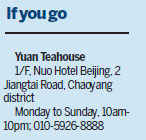
The next tea, Lapsang souchong, is lighter and scented. It is a black tea from northern Wuyi Mountain in Fujian province, known as Zheng Shan Xiao Zhong in Chinese.
The first sip delivered a pleasant sweet flavor reminiscent of dried longan fruits. Later it gave out more of a milky aroma, though of course no milk is added. We then came to Wuyi cinnamon, which has a more distinctive flavor than the first two delicate flavors.
Wuyi cinnamon is one of the most famous Wuyi rock oolong teas from Wuyi Mountain. It has a distinctive aroma similar, not surprisingly, to that of cinnamon.
The color of this tea was the brightest of the three. It had a finer luster but was a little thicker, and a distinctive but unobtrusive aroma of cassia lingered in the empty cup. The water used to make these teas is processed spring water from Wuyi Mountain, Dai says.
"Processed mountain spring water is the best for tea. if you cannot get processed bottles of spring mountain water, filtered tap water is OK. But definitely do not use mineral water or distilled water."
There is a trendy practice in some restaurants of pairing Chinese teas with dishes, which does not sit particularly well with Dai.
"It's not like pairing wine with food. I reckon drinking tea should happen on its own. But some traditional Chinese desserts can go with Chinese tea after a meal or with afternoon tea. Desserts with light ingredients such as lotus seed paste, sweetened bean paste, Chinese yams and sticky rice balls all go well with Chinese tea."
On the whole, Yuan Teahouse proved to be a nice discovery that is reasonably priced given the quality of the teas, and the surroundings that show China past and present create a soothing atmosphere.
|
A skilled server pouring tea for customers. Photos By Dong Fangyu / China Daily |
|
|
|
|
(China Daily USA 08/27/2015 page9)
- Turkey to hold snap parliamentary election
- Caroline Kennedy used personal email for official business
- Czech appeals for closing Schengen external border
- DPRK says inter-Korean contact gives lesson to South Korea
- Trial starts for Chinese scholar expelled from Norway
- Britain to crack down illegal working
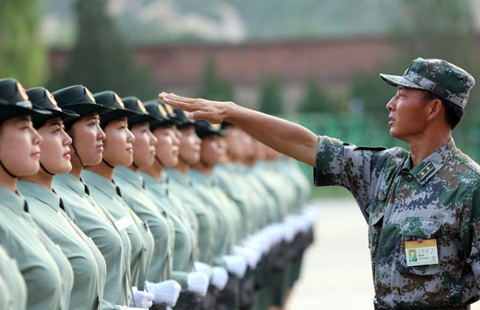
 Female honor guards train for military parade debut
Female honor guards train for military parade debut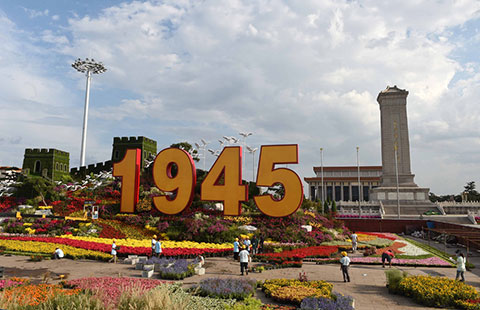
 Floral replica of the Great Wall appears on Tian'anmen Square
Floral replica of the Great Wall appears on Tian'anmen Square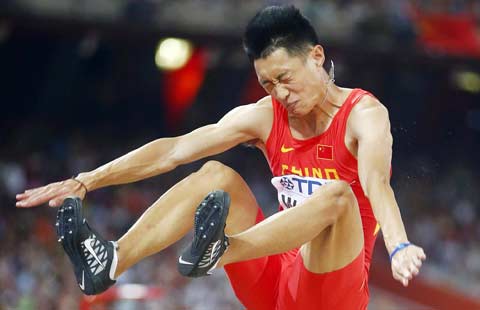
 Chinese long jumpers leap to history
Chinese long jumpers leap to history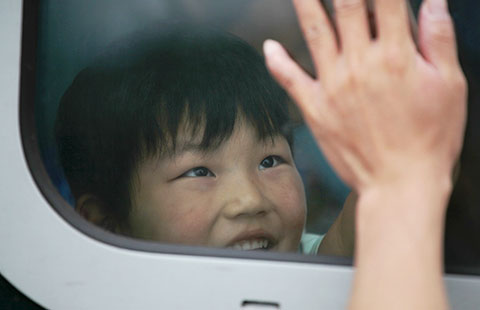
 Goodbyes and tears as left-behind children head home
Goodbyes and tears as left-behind children head home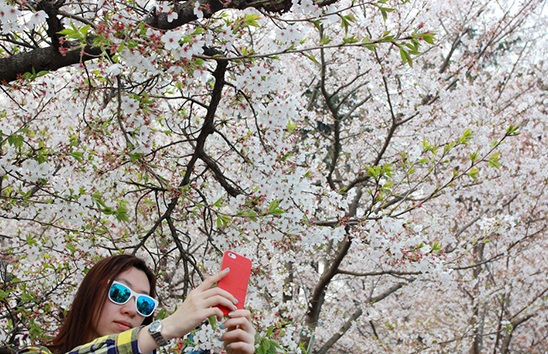
 Top 10 richest universities in China
Top 10 richest universities in China
 Chinese long jumpers leap to history
Chinese long jumpers leap to history
 Female honor guards train for military parade debut
Female honor guards train for military parade debut
 Top 10 richest universities in China
Top 10 richest universities in China
Most Viewed
Editor's Picks

|

|

|

|

|

|
Today's Top News
Suspect in Virginia TV shooting had history of workplace issues
Two US TV journalists fatally shot on air
Smaller cub died at National Zoo
Central bank lowers lending rate to ease debts
Officials on suspended death sentence face life behind bars
US National Security Adviser Rice to visit Beijing this weekend
Warner Bros plans to develop Chinese-language movies
Central bank announces rate cut to bolster real economy
US Weekly

|

|
